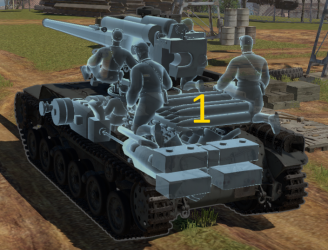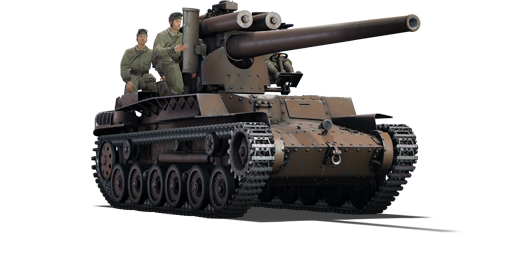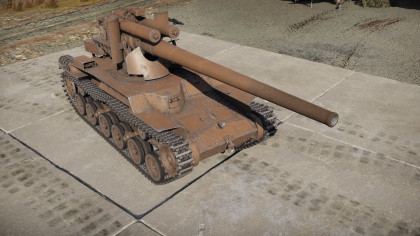Chi-Ha LG
Contents
| This page is about the Japanese medium tank Chi-Ha LG. For other uses, see Chi-Ha (Family). |
Description
The Type 97 Chi-Ha Long Gun is a rank Japanese tank destroyer
with a battle rating of (AB), (RB), and (SB). It was introduced in Update "Raining Fire".
General info
Survivability and armour
Armour type:
- Rolled homogeneous armour (Hull)
- Structural steel (Gun breech and mount)
| Armour | Front (Slope angle) | Sides | Rear |
|---|---|---|---|
| Hull | 25 mm | 25 mm Top 25 mm Bottom |
20 mm |
| Turret | 10 mm Turret front 10 mm Gun mantlet |
Mobility
| Game Mode | Max Speed (km/h) | Weight (tons) | Engine power (horsepower) | Power-to-weight ratio (hp/ton) | |||
|---|---|---|---|---|---|---|---|
| Forward | Reverse | Stock | Upgraded | Stock | Upgraded | ||
| Arcade | Expression error: Unexpected * operator. | 241 | Expression error: Unexpected round operator. | __.__ | |||
| Realistic | 150 | Expression error: Unexpected round operator. | __.__ | ||||
Armaments
Main armament
This gun shouldn't be confused with the one on the Chi-Ha Short Gun, while said Chi-Ha has a short gun meant for transport ships on anti submarine & close range fire range, the 12cm/45 10th Year was used as coastal emplacements and outfitted on early Japanese cruisers. It offers a high velocity gun to fling HE over the map with quite an ease.
| 120 mm 10th Year Type | Turret rotation speed (°/s) | Reloading rate (seconds) | |||||||||||
|---|---|---|---|---|---|---|---|---|---|---|---|---|---|
| Mode | Capacity | Vertical | Horizontal | Stabilizer | Stock | Upgraded | Full | Expert | Aced | Stock | Full | Expert | Aced |
| Arcade | 10 | -10°/+15° | ±60° | N/A | 8.80 | 12.19 | 14.80 | 16.37 | 17.41 | 13.00 | 11.50 | 10.60 | 10.00 |
| Realistic | 5.95 | 7.00 | 8.50 | 9.40 | 10.00 | ||||||||
Ammunition
| Penetration statistics | |||||||
|---|---|---|---|---|---|---|---|
| Ammunition | Type of warhead |
Penetration @ 0° Angle of Attack (mm) | |||||
| 10 m | 100 m | 500 m | 1,000 m | 1,500 m | 2,000 m | ||
| Ordinary, Mod.1 | HE | 25 | 25 | 25 | 25 | 25 | 25 |
| C.P.(BF) | SAPCBC | 103 | 102 | 95 | 87 | 80 | 74 |
| Shell details | |||||||||
|---|---|---|---|---|---|---|---|---|---|
| Ammunition | Type of warhead |
Velocity (m/s) |
Projectile Mass (kg) |
Fuse delay (m) |
Fuse sensitivity (mm) |
Explosive Mass (TNT equivalent) (g) |
Ricochet | ||
| 0% | 50% | 100% | |||||||
| Ordinary, Mod.1 | HE | 825 | 20.4 | 0 | 0.1 | 1,970 | 79° | 80° | 81° |
| C.P.(BF) | SAPCBC | 825 | 20.4 | 1.2 | 19 | 1,870 | 48° | 63° | 71° |
Ammo racks

| Full ammo |
1st rack empty |
Visual discrepancy |
|---|---|---|
| 10 | 1 (+9) | No |
Note:
- Shells are modeled individually and disappear after having been shot or loaded.
Usage in battles
Describe the tactics of playing in the vehicle, the features of using vehicles in the team and advice on tactics. Refrain from creating a "guide" - do not impose a single point of view but instead give the reader food for thought. Describe the most dangerous enemies and give recommendations on fighting them. If necessary, note the specifics of the game in different modes (AB, RB, SB).
Modules
| Tier | Mobility | Protection | Firepower | |
|---|---|---|---|---|
| I | Tracks | Parts | Horizontal Drive | |
| II | Suspension | Brake System | FPE | Adjustment of Fire |
| III | Filters | Crew Replenishment | Elevation Mechanism | |
| IV | Transmission | Engine | ||
Pros and cons
Pros:
- High shell velocity
- Quick reload for a gun of its size
- The C.P.(BF) combines the penetration of APHE and the splash-damage capability of HE. The explosion of a non-penetrating hit to a cupola can wreck the roof armor of a tank
- Versatile Chi-Ha chassis
- Quite fast (up to 44 km/h | 39 km/h), allowing it to get to certain spots in time
- Great turning ability in low gear
- Lovely climbing ability, Good to get in sniper locations
Cons:
- Gun shield is small and thin, doesn't provide too much cover
- Only one crew member is inside the tank
- Vehicle can be destroyed due low caliber MG fire even with full crew
- Two loader crew in the back of the tank have no direct cover
- 10 shells max
- Ammunition is very exposed, one lucky shot can destroy the vehicle
- Shells might have some trouble penetrating the front armor of some tanks, especially in uptiers
History
As the Chi-Ha was very structurally sound and is able to withstand high amounts of additional weights while maintaining stable stress-levels and speed. This made it a great testbed for heavier weapons and equipment.
- Design
One of these additions/variants was a Japanese Navy Construction Headquarters refit of the Chi-Ha to carry the 12 cm/45 10th Year naval cannon at the end of the war. Information of the development of the Chi-Ha Long Gun is scarce but what is certain is that they were to be constructed in defence of the homeland in-case of the highly probable American invasion, target allied armour and reposition after being shown.
Very slight changes took place with the most notable being the addition of a muzzle brake. The Chi-Ha would be simply used as a moving platform and hence all the default equipment from turret, hull machine gun, radio equipment and other interior pieces were stripped in exchange for ammo storage. The 12cm cannon was bolted on the hull and used similarly to the Archer in practice, firing from the rear to maintain recoil levels while firing.
The crew consisted out of 5 people; the driver, tank commander, two gun crew, and an ammunition carrier. The cannon could elevate 20° and decline to -10°. Operating the cannon wasn't an easy task either due to the set-up of the gun on the plain back of the Chi-Ha. On top of the fire rate of 2 shells per minute, this would take a massive toll once in actual combat.
- Usage
The first test took place in April of 1945 on mobility and firing. 30 shots were fired at varying distances with upgraded cannon sights, with the longest shot during the test being around 3 km. No discrete information about penetration capabilities were recorded or made it to the post-war reports.
While production plans were approved, no further vehicles beyond the prototype were recorded as being built or near completion by the end of the war.
The prototype recorded by the US was found with the Yokosuka 15th unit and is the only footage on said vehicle.
Media
- Skins
- Videos
See also
- Related Development
- Directly Related:
- Type 97 Chi-Ha (base hull)
- Related:
- Type 97 Chi-Ha Short Gun (another navy variant)
- Tanks of comparable role, configuration and era
External links
| Japan tank destroyers | |
|---|---|
| Ro-Go Derivatives | Ro-Go Exp. |
| Chi-Ha Derivatives | Ho-Ni I · Ho-Ni III · Ho-Ro · Chi-Ha LG |
| Ho-Ri | Ho-Ri Prototype · Ho-Ri Production |
| Other | Na-To |
| JGSDF | |
| SPRG | Type 60 (C) |
| SPH | Type 75 · Type 99 |
| ATGM | Type 60 ATM |
| Rocket | Type 75 MLRS |
| USA | ▅M36 |





